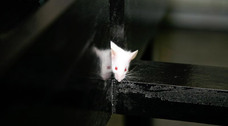2007-12-13

Animals Play Key Role in Douglas Mental Health Research
"There's none so small but you his aid may need," said French writer Jean de la Fontaine. This simple truth is evident every day at the Douglas Institute Research Centre, where small, white creatures with pink noses—laboratory rats and mice—are helping researchers discover causes and treatments for mental illness.
Genetic and Environmental Factors
Many mental illnesses have a genetic component. As a result, people with certain genetic makeups are more susceptible than others to developing mental illness. Because rats and mice have a genetic makeup similar to that of humans, they can help us assess the significance of genetic factors and identify “susceptibility markers” for individual people.
Control Measures, Standards, and Ethics
Animal housing conditions and experiment protocols of the Douglas must adhere to extremely high standards. All procedures and manipulations involving animals must be approved by two ethic committees—one at the Douglas Research Centre and the other at McGill University. The University Animal Care Committee at McGill University and affiliated institutes, like the Douglas, are subject to accreditation assessments by the Canadian Council on Animal Care (CCAC).
Human Health
It is essential to stress that Research Centre activities pose no risk to human health. Rigorous hygiene standards are maintained in everything from animal housing to waste management to protocols. Hygiene assessments are frequently conducted and minutely analyzed. As well, the Douglas animal laboratories are “going green”; a recycling program for organic waste from the animal laboratory is planned for the near future. Protocols will be implemented for this initiative as well, to ensure there is no risk to human health.


